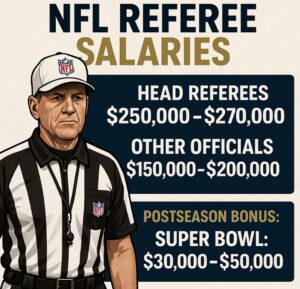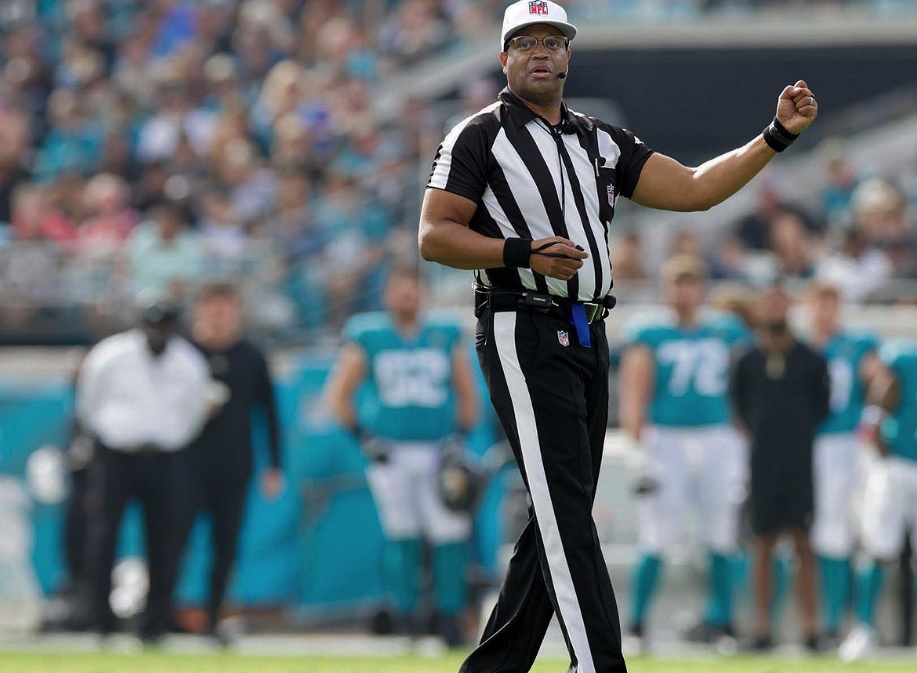Referees in the National Football League are under growing scrutiny. With millions watching each game, their decisions shape careers, outcomes and reputations. Meanwhile, the NFL itself continues to grow. In 2024, it generated over $20 billion in revenue, driven by media deals, sponsorships and record attendance. As profits rise, many are curious about those behind the whistle. The role of referees is not just high-pressure; it also demands expert knowledge of the game. This has led to increased interest in how well they are paid for their efforts. Search data shows a steady climb in queries related to referee compensation, particularly around contract updates and seasonal bonuses. This article explores the NFL referees salary 2025, presenting what’s currently known. From base pay to postseason bonuses, the figures help paint a clearer picture of what officials take home in today’s league.
Overview of NFL Referee Roles and Responsibilities
NFL referees carry a range of responsibilities that extend beyond the field. On game day, they enforce rules, manage the clock, and work with replay officials. Each has a defined role—referee, umpire, line judge, back judge—covering specific zones and calls. Unfortunately, there have been cases where questionable decisions by officials have affected betting outcomes. This tends to happen in less critical matches, sometimes promoted through unlicensed online casinos. If you’re placing bets, it’s important to use secure and legal sites. In Norway, only operators listed on https://gamblizard.com/no/nettcasino/trygge-norske-casino/ meet government-approved safety standards.
Outside game days, referees are expected to take part in training sessions, rule exams, and regular performance reviews. Their work is evaluated throughout the season, and only those with consistent accuracy are selected for high-stakes games. The NFL official pay scale reflects not just match-day duties but also the demands of preparation and scrutiny off the field.
Average Base Salary for NFL Referees in 2025
NFL referees are classified as part-time employees, but their salaries reflect the demands and visibility of their role. As of the 2025 season, the average base pay for referees is estimated to range between $205,000 and $250,000 per year. This is according to projections based on the last known collective bargaining agreement and salary trends published by reliable outlets such as Sporting News and Spotrac.
Although the NFL does not release detailed salary breakdowns for each official, industry sources indicate a steady increase in base pay since the 2019 CBA. Inflation, larger broadcast deals and rising revenue have all contributed to gradual raises across the league. In 2019, base pay was closer to $188,000. The increase to today’s figures represents growth of about 9–11% over six years.
That figure does not include additional payments for playoff games, which are performance-based and vary by round. Bonuses for postseason assignments can range from $1,500 to over $10,000 per game.
For readers asking how much do NFL refs make today, these estimates represent the most accurate public data for 2025. It’s clear that with the league’s expansion, compensation has followed a similar trend.
Factors That Influence NFL Referee Salaries
Several factors influence how much NFL referees earn. One of the biggest is tenure. Officials with more seasons in the league often receive higher base pay. Referees also earn differently based on role. Head referees—who lead crews and announce penalties—tend to earn more than line judges or field judges.
Postseason work adds another layer to compensation. Officials chosen for playoff games are paid per game, with rates increasing by round. According to reports, NFL playoff referee pay ranges from $1,500 for Wild Card games to over $10,000 for the Super Bowl. These assignments go to referees with strong performance grades during the regular season.
Though NFL referees work only part of the year, the role involves off-season duties. These include attending training camps, completing rules exams and reviewing game footage. Despite their part-time status, the overall time commitment is considerable—often extending into the off-season. As a result, pay levels reflect both in-game performance and preparation away from the field.

Bonuses and Other Compensation
NFL referees receive several forms of compensation beyond their base pay. Bonuses for postseason games are the most significant. Officials selected for the Super Bowl may earn over $10,000 for that one assignment. Earlier rounds offer lower bonuses, typically between $1,500 and $5,000.
In addition to game-related bonuses, referees receive travel stipends and daily per diems during the season. These cover hotel stays, meals, and incidentals. The league also contributes to a defined-benefit pension plan, which becomes available after a set number of credited seasons.
Health insurance is included as well, despite the part-time status of the job. This covers medical, dental, and vision care during and after the season.
These additional forms of compensation are considered standard NFL referee benefits, and they help make the role financially competitive. While the public often focuses on base salary, these extras contribute significantly to overall earnings.
Comparison With Other Sports Leagues
NFL referees typically earn a base salary between $205,000 and $250,000 for a 17-game regular season. Their pay structure reflects the league’s shorter schedule compared to other major sports.
Other leagues have longer seasons and different compensation models:
- NBA: Referees work up to 82 regular-season games. Salaries range from $180,000 for new officials to $550,000 for veterans.
- MLB: Umpires earn $150,000 to $450,000 annually, with 162 regular-season games plus spring training.
- NHL: Referees earn between $200,000 and $430,000 per season; linesmen earn slightly less.
The NFL’s part-time status contrasts with full-time roles in the NBA and MLB. However, the higher per-game pay in the NFL reflects the smaller number of games. All major leagues offer postseason bonuses, travel allowances, and benefits. These figures highlight the structural differences between leagues more than direct equivalence in yearly pay.
Conclusion
NFL referees are paid based on their role, years in service, and postseason assignments. Their compensation includes not only base salary but also travel stipends, health coverage, and retirement benefits. Referees selected for playoff games receive additional bonuses, reflecting performance and consistency across the season. While exact contracts are not public, verified estimates offer a reliable picture of total pay.
For anyone asking how much do NFL refs make, the answer depends on several factors. Head referees and long-serving officials tend to earn more, particularly with repeated playoff appearances. The structure reflects both the seasonal nature of the league and the expectations placed on its officials throughout the year.





